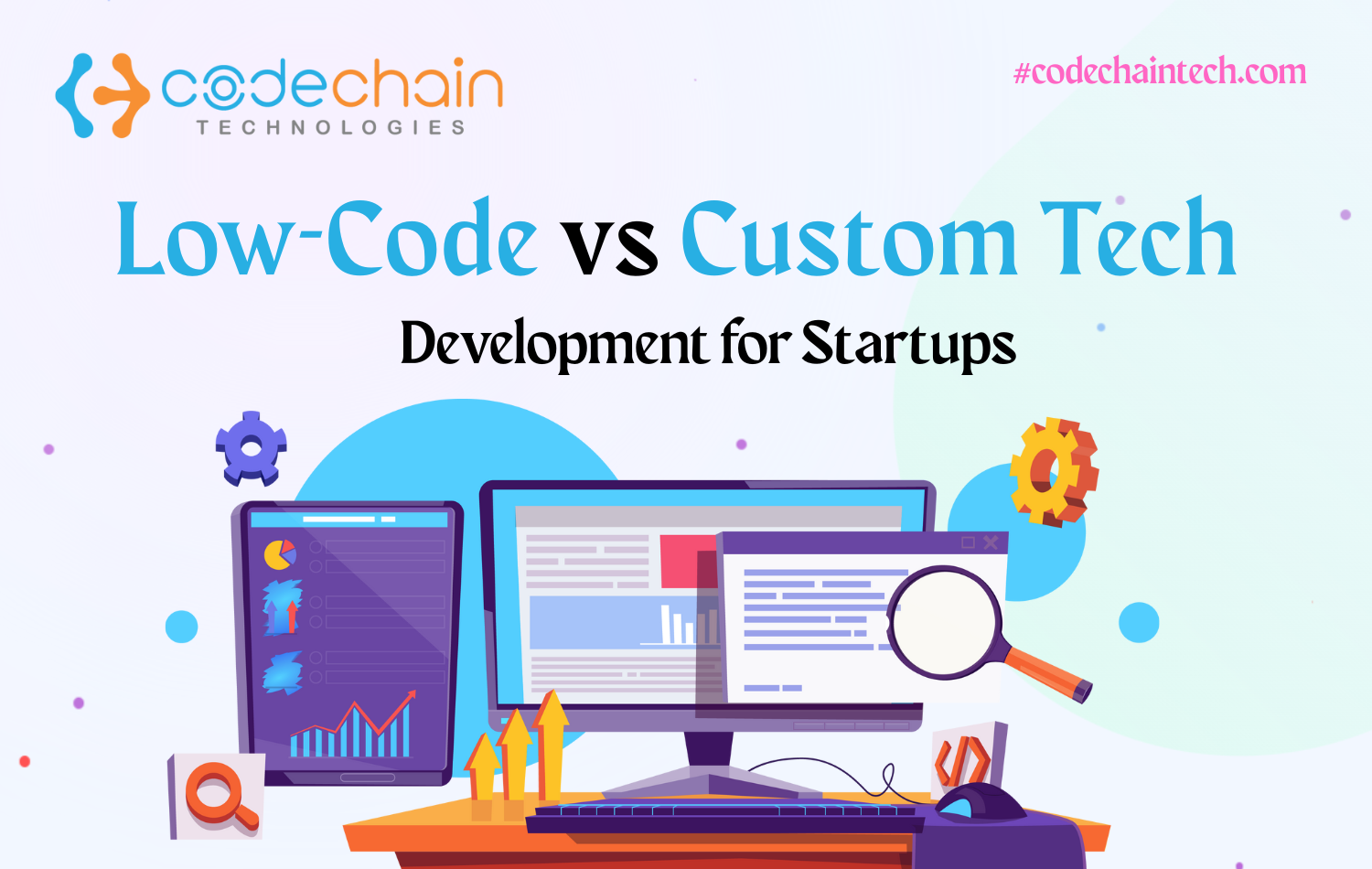
The decision between low-code and custom applications is one of the most critical that any startup must make in the current digital landscape. Because technology changes so quickly, business owners have to choose between quick, cheap development and software that can grow with their business. There are good and bad things about both low-code development and custom tech development. Choosing the right one can make or break your startup.
This blog post is good for SEO and will explain the differences between low-code and custom apps, their pros and cons, and how to pick the one that will help your business the most. Let's break down each choice into simple terms.
What Is Low-Code Development?
Using visual tools, drag-and-drop interfaces, and pre-built modules, low-code development is a new way to make software. It cuts down on the amount of code that needs to be written, making it easy for anyone to make apps quickly.
Advantages:
Fast Development: The time needed for development is significantly reduced by low-code tools. Prototypes or MVPs can be apps developed by startups in weeks, rather than months.Lowered Initial Cost: The overall cost is reduced by the fact that fewer developers are necessary, as minimal coding is required.Convenience: The visual interface is user-friendly, allowing the web development of applications by individuals who are not developers.Quick Market Testing: Great for startups seeking to rapidly attract investors or validate ideas.Integrated Cloud Support: Most low-code platforms are equipped with database integration and cloud hosting.
Limitations:
Vendor Lock-In: The pricing, policies, and availability of the platform are every factor that influences the functionality of your app.Performance Issues: Complex applications can face scalability as well as performance challenges.Security Concerns: The provider's technology is responsible for data storage and compliance.Hidden Costs: Premium features or extra consumers may require paid subscriptions.
What is the process of making a custom app?
Using programming languages and frameworks like React, Node.js, Laravel, Python, or Flutter, custom app development means making apps from scratch. It provides you full control, flexibility, and the ability to grow your business. This is excellent for new businesses with unique ideas or long-term goals.
Full Customization: Each feature is customized to fit your business's exact needs.Better Scalability: Unique apps grow as your business expands.Improved Performance: Developers can maximize code for speed and efficiency.Better Security: You decide how to store and secure your data.Ownership and Control: You are in control of your intellectual property, database, and source code.
Low-Code vs Custom Apps
Why Startups Like Low-Code at First
Speed and cost are very important for new businesses. We build custom eCommerce solutions that deliver high performance. They can build and test ideas on low-code platforms without having to hire a whole development team. A lot of founders start with low-code for these reasons:
Quick MVP creation: Great for showing investors a working version.Fewer technical barriers: Founders who don't know much about technology can help build.Less financial risk: Don't spend as much money until you know your business model works.Easier to change direction: If the product approach changes, you can make alterations quickly.
Why It's Important Over Time
If your startup's idea is proven and you have a growing number of users, custom tech development is the better long-term choice. It makes sure that your app:
- Works well with a lot of users at once
- Works well with tools from other companies
- Changes to fit new technologies and business goals
- Makes your brand greater by giving it a unique look and feel
Working with a custom software development company like codechain technology Software Technologies can help startups move from MVPs to scalable, enterprise-level applications without any problems.
Hybrid Approach: Best of Both Worlds
A lot of successful startups use a mix of low-code and custom-built systems. They start with low-code to get things done quickly and then move to custom-built systems as they grow.
For instance:MVP with Low-Code: Apply Bubble or PowerApps to quickly build the main idea.
Validation: Get data, feedback from customers, and interest from investors.
Custom Build: Scale, perform, and brand with Laravel, Node.js, or Flutter.
This mix lets startups stay flexible while also laying the groundwork for the future.
CodeChain Technologies’ Expert Insight
At CodeChain Technologies, we help startups choose the perfect development path - whether that’s low-code, custom software, or a hybrid model. Our team specializes in:
- Custom web & mobile app development
- UI/UX design & digital transformation
- Startup MVP development
- Cloud and backend integration
We understand that every startup is unique. That’s why we combine speed with scalability - delivering tailored solutions that grow with your business.From ideation to deployment, we handle every phase with transparency, agile practices, and cutting-edge technology.
How to Make the Correct Choice for You
Select Low-Code Apps if
- You urgently need a prototype or MVP.
- Your technical knowledge is limited.
- The requirements for your app are straightforward.
- You're evaluating a concept or the reaction of the market.
Select Custom Apps if
- Your product needs intricate integrations or logic.
- You anticipate rapid scaling or high user traffic.
- Priorities one and two are security and performance.
- You desire complete control over your brand and ownership
Conclusion
It's about planning, not competition, when it comes to low-code versus custom apps.
Low-code platforms are ideal for quickly validating an idea if you're a new startup. But custom app development is the better choice if you want scalability, long-term success, and distinctive branding.
In order to get traction, many startups start with low-code, then transition to custom development after obtaining capital or stabilizing their market. Your budget, objectives, and goal will determine the best course of action.With technology that develops with your company, CodeChain Technologies helps you launch swiftly and scale with confidence.
FAQ
Q1. What is an example of low-code vs custom app development?
A startup using Bubble to build an MVP is low-code, while creating a unique app with React and Laravel is custom development.
Q2. What is low-code development?
Low-code development uses visual tools and minimal coding to build applications quickly.
Q3. What is custom app development?
Custom app development involves creating software from scratch using full programming control.
Q4. Which is faster: low-code or custom apps?
Low-code is faster to build and launch, while custom apps take longer but offer flexibility.
Q5. Are low-code apps cheaper than custom apps?
Yes, low-code platforms usually cost less initially than full custom development.
Q6. Can low-code platforms scale for large businesses?
Low-code apps work well for MVPs but may face limits when scaling to the enterprise level.
Q7. Which is better for startups - low-code or custom apps?
Startups often start with low-code for speed, then shift to custom apps as they grow.
Q8. What is an example of low-code vs custom development?
Using Bubble for a prototype is low-code; building with React and Laravel is custom.
Q9. Do low-code apps offer enough security?
Security depends on the platform, while custom apps allow complete data control
Q10. Why choose CodeChain Technologies for app development?
Because CodeChain Technologies provides expert low-code and custom software solutions tailored for startups.
A startup using Bubble to build an MVP is low-code, while creating a unique app with React and Laravel is custom development.
Q2. What is low-code development?
Low-code development uses visual tools and minimal coding to build applications quickly.
Q3. What is custom app development?
Q4. Which is faster: low-code or custom apps?
Low-code is faster to build and launch, while custom apps take longer but offer flexibility.
Q5. Are low-code apps cheaper than custom apps?
Yes, low-code platforms usually cost less initially than full custom development.
Q6. Can low-code platforms scale for large businesses?
Low-code apps work well for MVPs but may face limits when scaling to the enterprise level.
Q7. Which is better for startups - low-code or custom apps?
Startups often start with low-code for speed, then shift to custom apps as they grow.
Q8. What is an example of low-code vs custom development?
Using Bubble for a prototype is low-code; building with React and Laravel is custom.
Q9. Do low-code apps offer enough security?
Security depends on the platform, while custom apps allow complete data control
Q10. Why choose CodeChain Technologies for app development?
